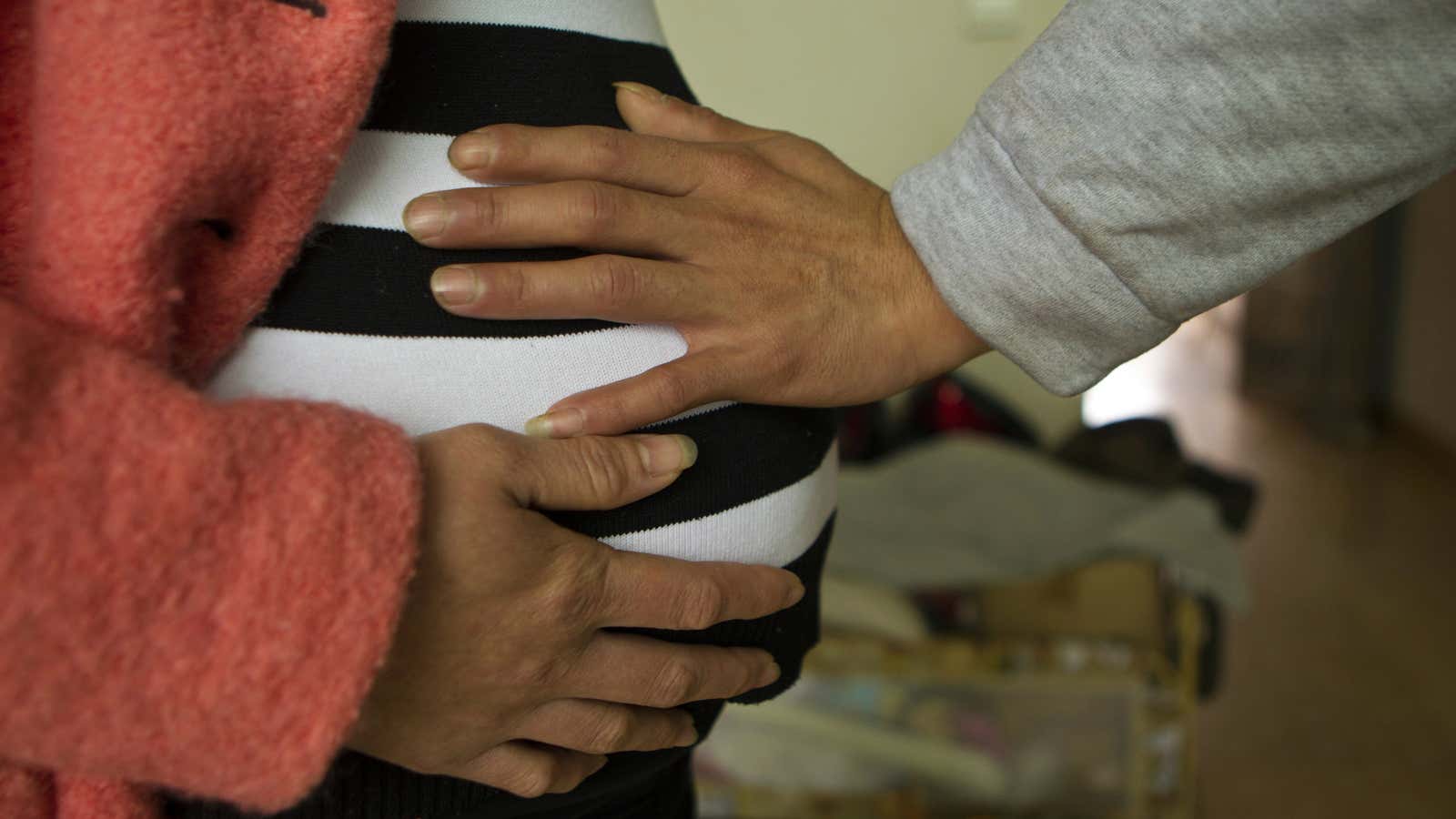The concept of “baby brain” is strongly embedded in popular culture. Many of us expect pregnant women to have the odd moment of stupidity—and even more so once the child is born—and attribute the dippy behavior to this well-known phenomenon.
But despite popular acceptance of baby brain theory, scientific literature on the subject is decidedly mixed. And, as New Scientist reports, there’s growing evidence of the positive cognitive effects that come with having a child.
It’s not as though there’s no evidence to support conventional theories of baby brain. It’s just that cognitive impairment is focused on working memory, and studies show relatively small effects. The results are far from conclusive, and are countered by studies showing no cognitive differences during pregnancy and early motherhood.
“The only consensus that we have is that the data are mixed at this point,” says Joanna Workman, assistant professor in behavioral neuroscience at the University at Albany, in New York. Given the lack of definitive scientific evidence, Workman tells Quartz she’s not sure why there’s such widespread belief in baby brain. “This is a question that applies to other areas as well, for example why people believe the lunar phases of the moon are associated with psychological function and behavior,” she says.
Katherine Tombeau Cost, a psychology researcher at the University of Toronto, didn’t feel at all cognitively impaired when she was pregnant, and her graduate school course grades remained as high as ever.
“I was concerned that I might be impaired and that I wasn’t aware of it,” she tells Quartz. “I worked hard, but my exam and course grades were excellent—as they had been before I got pregnant. So I said ok, obviously I’ve demonstrated to myself that I’m not impaired.”
Tombeau Cost noticed that several studies of pregnant women found a subjective assessment in reduced cognition, but no objective evidence. She says that, in light of the cognitive load pregnant women are under, it’s “amazing” that large studies found no objective impairment.
“When a woman becomes pregnant and a new mother, she has much more to think about. Any person can tell you that when you’re thinking about more, you start to feel as though you’re not feeling about anything particularly well. You feel more stressed and more overwhelmed and more as though you’re falling behind,” she says.
Tombeau Cost looked at the scientific literature on the effects of pregnancy on cognition and noticed that there actually seemed to be some benefits—at least in studies involving lab rats.
Craig Kinsley, a psychology professor at University of Richmond, found that rats seem to have improved foraging abilities and memory shortly after giving birth—which makes sense, as this skill increases their offspring’s chances for survival.
Kinsley tells Quartz his research was inspired by watching his own wife’s behavior shortly after giving birth. “I noticed my wife becoming much more efficient and able to do everything she did before, plus take care of a new baby. I put these ideas into the lab and started testing them and it was just like finding a gold mine,” he says.
Kinsley says that existing research on the effects of pregnancy doesn’t seem to consider which aspects of cognition would be useful for child rearing. The notion that there are cognitive benefits to pregnancy “fits like a glove both evolutionarily and biologically,” he adds.
Tombeau Cost was inspired by Kinsley’s work to look at spatial memory in humans. She didn’t find any impairment—though she didn’t find improvement either—and reasons this is because foraging isn’t an overly useful skill for human mothers.
Whereas rats are single mothers who leave their infants at home to forage for food, humans are more social in their child rearing. “You also have your own parents and siblings and people in your community—your best friend who says, ‘I’ll bring over a lasagna,’ or something like that,” says Tombeau Cost.
In line with this theory that social skills become especially important during motherhood, there’s also evidence to suggest that mothers become better at recognizing emotions in others. “That’s important—you want to quickly pick up whether the person who’s approaching you is a good person or bad person,” says Tombeau Cost.
Her latest work, which was presented at the Neurobiology of Parenting conference in Stockholm in August 2015, and also at the World Congress in Psychiatric Genetics in October 2015, examines the roles of cognitive flexibility and decision-making in parenting. Tombeau Cost theorizes that parents have to adapt their behavior as their children grow—think of the different needs of, say, infants and teenagers. “The mother’s mothering has to develop as their child develops. In my current work, we’re finding that executive functions are very important in the development of the mother as the child gets older,” she says.
Other researchers are examining similar theories: As the New Scientist reports, Laura Glynn from Chapman University in California is examining whether evidence that mother owl monkeys are better at strategic planning also applies to humans.
One reason we have so few definitive answers is because women are generally under-represented research subjects in biology, says Kinsley. It will take several major studies to try and definitively establish the effects of pregnancy and motherhood on the human brain. “Science is often perceived as a body of facts,” says Tombeau Cost, “but in fact it’s more of a method to try and build a body of facts.”
Though women may self-report memory lapses during pregnancy, she says it’s important to do larger experiments to test the conclusion, and examine any positive cognitive abilities that come with pregnancy. In this case, it makes sense to challenge the idea that pregnancy makes people stupid.
“You’re about to do some very demanding work,” she says, “So the idea of ‘baby brain,’ and that the mother would become impaired, doesn’t make much sense.”




